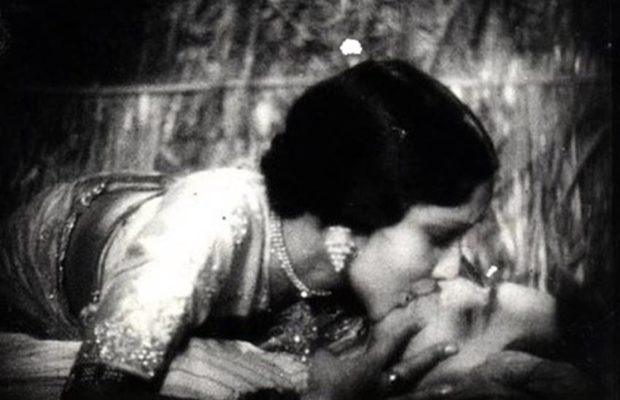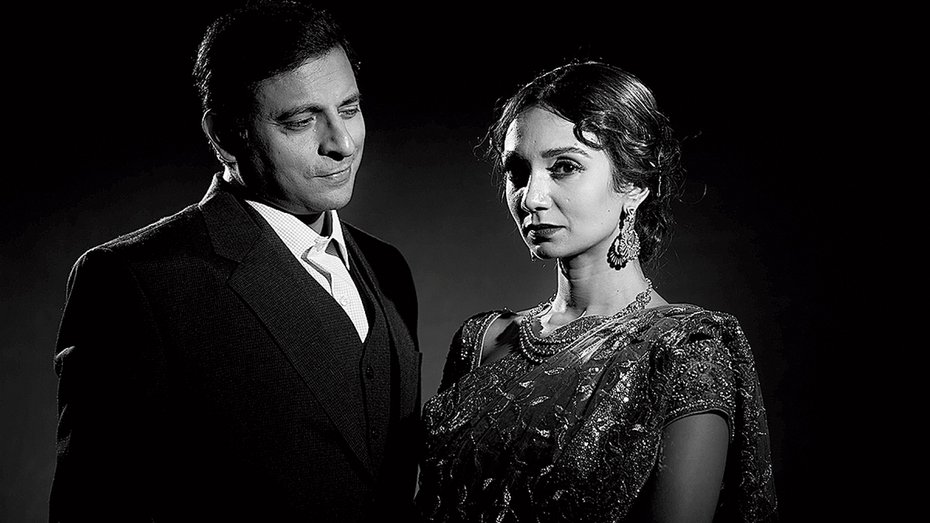Deepa Gahlot muses on the stunning Devika Rani, who set Indian movie screens afire with a kiss back in 1933
Devika Rani is in focus at present due to Lillette Dubey’s play based on her life. The actress-producer, the great-grand-niece of Rabindranath Tagore, was known for her stunning beauty. She was the first female superstar of Indian cinema, at a time when educated women from cultured families did not work in films. Along with her husband Himanshu Rai, she established Bombay Talkies in 1934–India’s first professionally run studio, that she continued to manage after Rai’s death (in 1940), the first woman to head a studio.
Looking back then, at her debut film Karma (1933), that has gone down in movie history as the film that had a four-minute kiss.
Karma was produced by Rai just two years after the advent of the talkie (Alam Ara 1931), and he had the foresight to make an English version for western audiences—his fourth international production, after the silent films, The Light Of Asia, Shiraz and A Throw of Dice (1929).
Directed by J. L. Freer-Hunt, the bilingual film (Fate aka Song Of The Serpent in English) the film had a crew made up of both Indians and Westerners. It premiered in England (with a special screening arranged for the royal family) and was a critical and commercial success, perhaps because it had just the kind of exotica—beautiful locations and exquisite costumes— the West would appreciate. Not surprisingly, the simplistic love story was rejected by Indian audiences back home when the Hindi version was released a year later.
Devika Rani played the Maharani of Sitapur, who is in love with the prince (Himanshu Rai) of the neighboring kingdom of Jayanagar. His father, the elderly maharaja (played by Dewan Sharar who was also the film’s co-writer with Rupert Browning) disapproves of the maharani, because of her modern ideas on education and healthcare for all. The prince, however, defies his father to woo her.
The Maharaja of Jahanagar loves to hunt, but there are no tigers on his land so the maharani decides to hold a tiger hunt in her kingdom and invite the king to participate, hoping this will make him change his mind about her. The idea doesn’t go down well with the good people of Sitapur whose religious views forbid them from killing animals. A determined maharani decides to go ahead anyway and organizes a big festival for the disgruntled populace hoping it will soften their mood.
During the hunt, the prince accidentally kills a man and is also bitten by a cobra; The maharani rushes to her unconscious beloved’s side and kisses him in a fit of desperation (cue the famous kissing scene) pleading to the Gods for her prayers to be answered. The snake charmer goes off to look for the snake—he believes if the snake bites the prince again it will work as an antidote to the poison. The maharaja placates the angry public and his bad karma by giving alms to the poor. The snake is found, the prince is saved and the film ends on an abrupt but happy note. 
After it flopped, Rai quit acting and concentrated on movie-making. Bombay Talkies produced over a hundred films and launched dozens of careers. A major scandal ensued when Devika Rani eloped with the handsome actor Najmul Hassan. She was eventually persuaded to return, but because of this incident, Hassan’s career as a leading man was ruined. His loss proved to be Ashok Kumar’s gain when Himanshu Rai chose a laboratory assistant, Kumudlal Kunjilal Ganguly, renamed him, and made him the new hero of Jeevan Naiya (1936). To Devika Rani goes the credit of discovering a fruit merchant’s handsome son, Yusuf Khan, better known as Dilip Kumar, and casting him in Jwar Bhata (1944). She was also instrumental in the making of Kismet (1943), one of the biggest blockbusters of Indian cinema.
In 1945, she married the Russian painter Svetoslav Roerich and retired from the industry. She was the first recipient of the Dadasaheb Phalke Award, when it was instituted in 1970.








